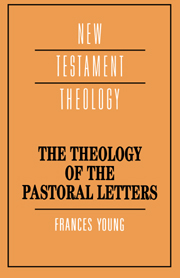Book contents
- Frontmatter
- Contents
- Editor's preface
- List of abbreviations
- 1 Theology and its context
- 2 Theology and ethics
- 3 God and the divine activity
- 4 The importance of sound teaching or What about doctrinal orthodoxy?
- 5 Duties in the household of faith or What about church order?
- 6 The contribution of the Pastorals to the reception of Paul as an Apostle
- 7 The Pastorals as scripture
- Annotated bibliography
- Index of references
- Index of subjects
6 - The contribution of the Pastorals to the reception of Paul as an Apostle
Published online by Cambridge University Press: 01 October 2009
- Frontmatter
- Contents
- Editor's preface
- List of abbreviations
- 1 Theology and its context
- 2 Theology and ethics
- 3 God and the divine activity
- 4 The importance of sound teaching or What about doctrinal orthodoxy?
- 5 Duties in the household of faith or What about church order?
- 6 The contribution of the Pastorals to the reception of Paul as an Apostle
- 7 The Pastorals as scripture
- Annotated bibliography
- Index of references
- Index of subjects
Summary
One of the problems of the Pastorals in modern times has been the rather stale, defensive debate about Pauline authorship. After what has been said so far, it is possible to see how the ground can be shifted, and a more positive approach developed. Modern assumptions focus on individuals, but Paul, remarkable man though he must have been, was deeply incorporated into a community. Waiving the question of authenticity for the moment, the Pauline letters are almost invariably co-authored: 1 Corinthians is sent from Paul and Sosthenes, 2 Corinthians, Philippians and Colossians from Paul and Timothy, 1 and 2 Thessalonians from Paul, Silvanus and Timothy; even that most personal letter to the Galatians associates ‘all the brethren with me’ in Paul's opening greetings. So Romans and Ephesians are the exceptions that prove the rule. Paul worked with associates and assistants, through fellow-travellers and networks of communication, and relied on local leadership–he only wrote letters when things broke down.
But clearly the network of followers and communities which he thus formed had a special, if sometimes troubled, relationship with him, and despite his attempts to encourage mature independence, sometimes these Gentiles diverged so unexpectedly and so far from his Jewish presumptions that he found himself attempting to assert authority over them. For the sake of order and decency, Paul himself had encouraged converts to maintain the social status quo, giving far from radical advice on the place of women and slaves. Already in his lifetime, assuming the authenticity of Philippians, local leadership offices were being established, modelled on household service and administration, and probably carrying considerable authority.
- Type
- Chapter
- Information
- The Theology of the Pastoral Letters , pp. 122 - 144Publisher: Cambridge University PressPrint publication year: 1994



